
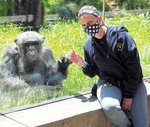
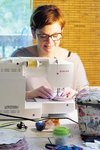
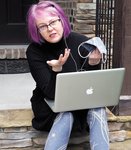
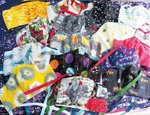
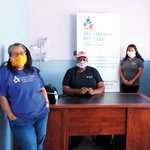
What is it?
Masks for Many is a project created by Mike Wiley in conjunction with the Chatham Arts Council designed to create face masks for vital workers — many of them people of color — employed at medical facilities, grocery stores, drug stores, and in delivery services. Many of those workers don’t have the equipment they need to protect themselves, leaving them at significant risk for infection.
How does it work?
By partnering with a consortium of concerned citizens, Masks for Many is seeking donations that will be used to cover materials costs and pay a small stipend to artists to create cloth masks for donation to local businesses, essential workers, healthcare facilities, and more. The project is being done with the help of local textile and costume artists who are also struggling with the huge economic impact of the pandemic. The masks are made from two layers of 100 percent cotton and are machine-washable. Though they’re not medical grade, they are designed with the Centers for Disease Control and Prevention recommendations.
How did Masks for Many get started?
Wiley, a Pittsboro-based author, playwright and activist, in collaboration with Holly Ewell-Lewis, community activist and fundraiser, and Holly Brown, marketing consultant and copywriter, created Masks for Many. The three have worked together for more than a decade on a variety of projects and decided to team up to bring to fruition Mike’s idea of offering free masks for vital workers while at the same time providing revenue for artists whose incomes have been suddenly and adversely affected by the pandemic.
“COVID-19 has impacted our community in a dramatic way,” Ewell-Lewis said. “People who provide basic services, such as checkout and restocking clerks in grocery stores, employees working in local pharmacies and drug stores, trash pickup, etc., often are not given any sort of mask or single-use plastic gloves to protect themselves.”
Together, with the help of the Chatham Arts Council and beneficiaries of the program, Masks for Many partnered with interested artists and makers to create cotton masks to share with employees who do not have that protection. In return, these artists and makers receive a small stipend for their work. The goal is to make 1,000 masks. Right now, there are enough artists making masks — the project needs donations in order to get more supplies for more masks.
Who are some of the people making masks?
Andrea Akin of Pittsboro had a sewing machine in her attic for 10 years, given to her by her husband. When the pandemic hit locally, Andrea decided to retrieve the sewing machine, still in its original box, and make masks for some of her nursing friends. She found out about Masks for Many from her friend Wiley and began helping out. A self-employed photographer, Akin set up shop and is making dozens of masks for people who continue to go to work every day and need protection.
Rachel E. Pollock is the first person those who want to sew Masks for Many speak with. She’s a furloughed costumer with Playmakers Repertory Company and teaches at UNC-Chapel Hill in the costume production MFA program. She also designs and makes elaborate costumes and hats for actors in the Playmakers Repertory Company. She and others in the Playmakers Repertory Company at UNC are discussing how to adapt their MFA program to “the times of COVID.”
What are some of the organizations getting masks?
Communities In Schools of Chatham County is part of a national organization that provides mentoring and counseling to at-risk students identified by teachers and principals. CIS specialists visit Chatham County schools on a weekly basis. Wiley initially delivered 25 masks to CIS Schools to families who had family members infected with the coronavirus. As more masks are made, CIS will provide them to families in need.
Jodi Wiley and her chimpanzee zookeepers at the North Carolina Zoo in Asheboro received cotton protective masks from Masks for Many to supplement disposable masks provided by the zoo. Zookeepers are considered essential workers during the pandemic.
How can people get masks? How can people help?
Masks for Many wants to hear from Chatham County-based companies who need masks for their employees. Please go to the Chatham Arts Council website (www.ChathamArtsCouncil.org) and fill out the form requesting masks for your employees. There is no charge for the masks.
At the site, you can also make a financial donation or request masks for your employees.